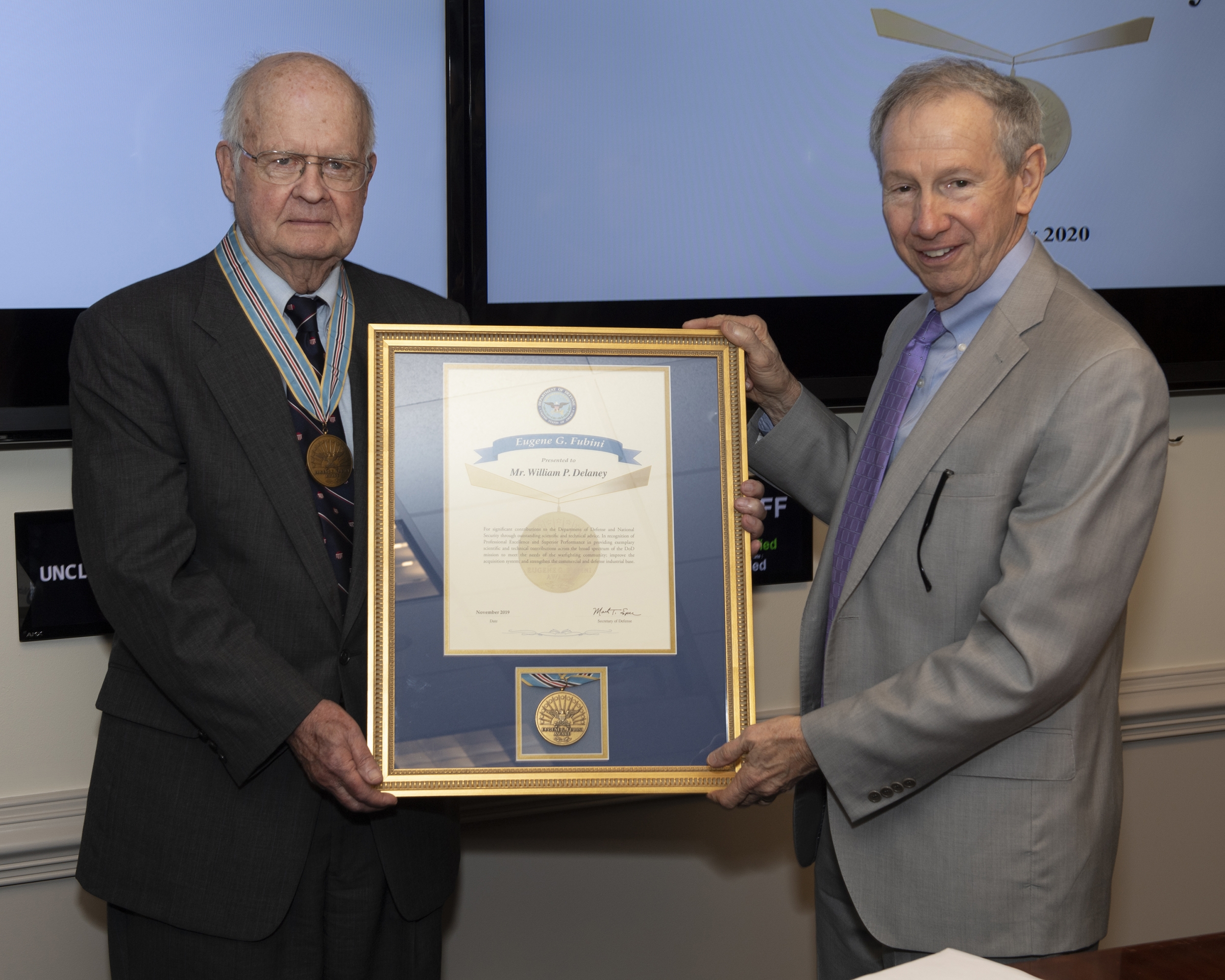William Delaney receives 2019 Eugene G. Fubini Award

William Delaney, Director’s Office Fellow, received the 2019 Eugene G. Fubini Award in recognition of his many years of significant contributions as an advisor to the Department of Defense (DoD). The Fubini Award is the highest award given by the Secretary of Defense to a civilian who has had advisory roles in national-level defense studies and task forces.
Delaney’s involvement with the Defense Science Board spans nearly 30 years and multiple task forces. From 1991 through 2019, he participated in 34 Defense Science Board studies, including 14 studies on which he served as a chair or co-chair. Past studies that Delaney has chaired or co-chaired covered topics such as the Global Positioning System (GPS), underground facilities, Patriot performance for Operation Iraqi Freedom, and electronic warfare.
“The Defense Science Board engages in a very wide variety of study topics. I have led task forces on the GPS navigation system where we considered enemy countermeasures to GPS guidance and evaluated ways to make the system more immune to such attacks. In another task force, we considered the challenge of locating and identifying buried live munitions on our test ranges so they could be removed. This was a challenging technical problem, since a buried soda can may look like a hand grenade. We described advanced instrumentation to help the process of clearing valuable land of buried munitions,” Delaney said.
During his career at Lincoln Laboratory, Delaney has held technical and leadership roles across several research areas. He oversaw the installation and operation of the ALCOR missile tracking and signature radar at the Lincoln Laboratory field site on the Kwajalein Atoll in the Marshall Islands. In the late 1970s, he founded the Air Vehicle Survivability Evaluation Program, which continues to provide analysis for understanding and predicting the survivability of U.S. aircraft. Upon his return to Lincoln Laboratory from a three-year tour in the Office of the Secretary of Defense, he served as an Associate Division Head of the Radar Measurements Division, Head of the Surveillance and Control Division, and Assistant Director of the Laboratory.
In 1995, Delaney and then-Assistant Director David Briggs initiated the MIT Lincoln Laboratory Defense Technology Seminar to involve military officers in discussions about the Laboratory’s capabilities and ways in which modern electronic technologies could serve military needs. In the seminar’s 20 years of activity, Delaney said, it has seen more than 1,150 attendees and has achieved its goal of fostering dialogue between military and technology experts.
In addition to receiving the Fubini Award, Delaney has been recognized in the past with the Secretary of Defense Meritorious Civilian Service Medal for his service to the DoD and the U.S. Air Force Exceptional Civilian Service Medal for his contributions to the Air Force Scientific Advisory Board. He is a Fellow of the IEEE and a member of the National Academy of Engineering, and he is the lead author of the book Perspectives on Defense Systems Analysis, published by MIT Press in 2012.
“The Fubini Award is a great honor but a humbling one when I consider the accomplishments of the past 21 recipients,” Delaney said. “The Defense Science Board is a collection of very talented, patriotic individuals who help the Department of Defense leadership with questions in science and technology. My association with the board for close to 30 years has been both a privilege and a pleasure.”
The award was presented to Delaney at the Defense Science Board Winter Quarterly, which was held on 12 and 13 February 2020.